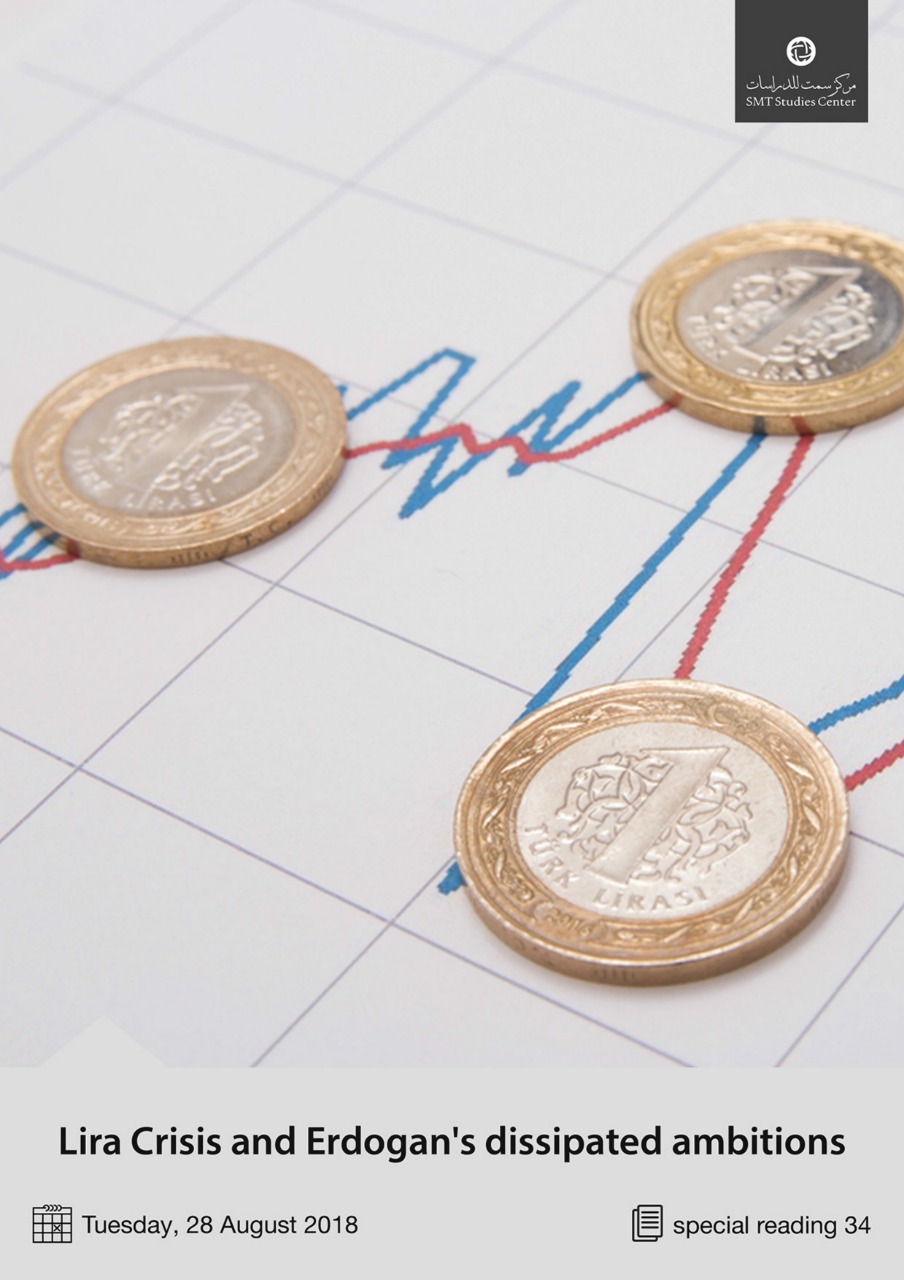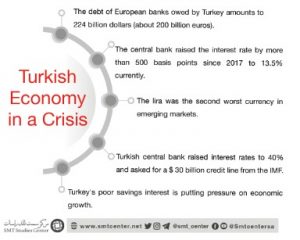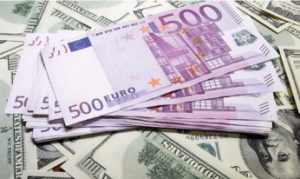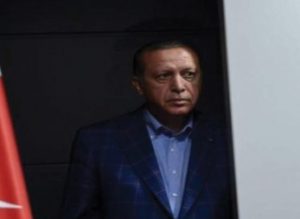Subscripe to be the first to know about our updates!

Lira Crisis and Erdogan’s dissipated ambitions
The current Turkish economic crisis has entered a new phase, the national currency lost about 40% of its value against the US dollar during few months. Turkey has been isolated from major economies in it regional context, it lost the most important markets in the world. Turkish-European relations were strained by the Turkish President’s micro-war in recent years. Ankara lost most of its land trade routes with neighboring countries, Syria and Iraq. These countries, prior to their invasion of terrorism, mostly from the Turkish border, constituted Turkey’s route to the Arab world and crossed its export convoys, which reduced dollar revenues.
The direct cause of the current crises is the detention of the US pastor on charges of involvement in terrorist acts. Such act couldn’t be separated from the recent Turkish policies after the failed attempted coup in 15 July 2016 , and the subsequent repressive practices towards tens of thousands of opponents of the Turkish military and civilians.
The first thread in the current crisis begins with the practices of the Turkish government, which gave Trump the opportunity to take action that seemed to have led to an economic crisis in Turkey. Trump’s punitive actions against Turkey undoubtedly had negative economic consequences. But the crisis did not begin with certainty, but is rooted in the political model that has crystallized in Turkey in recent times, where the Turkish political system from the parliamentary formula to the presidential formula, and the presidential system is one of the stable formulas of democratic systems of governance, but requires a set of elements not to become An undemocratic situation witnessed by many countries in the third world. One of the features of the parliamentary system is the powerful independent legislative authority, which is not available in those countries. Thus, what actually happened is that the Turkish regime has moved from parliamentary to presidential, N this case existed since before the referendum which approved the transition to a presidential system of government, despite the democratic formalities.

Bad Crisis management
Since he won the recent election Erdogan and his Justice and Development Party JDP strived to expand his powers for more control over all of society in a country with 81 million people. After 15 years in power, Endogen is still touring the country tirelessly, and holds party meetings. He gave speeches to the crowds with an average of three letters a day, most of which are broadcast live.
Analysts say the current economic crisis is a result of Erdogan’s poor management of Turkey – unsustainable borrowing, nepotism and huge public works that generate little economic returns. Erdogan now has the burden of rebalancing the troubled nation. He may not have strong solutions to confront it.
Erdogan’s son -in-Law doesn’t solve the crisis but rather complicates it
Erdogan appointed his son-in-law Berat Albayrak, as a minister finance and treasurer, Albayrak used to attend meetings and reviewing steps to solve the crisis at conferences using Power Point. But the Turkish people elected Erdogan, not his son -in-law, that one of reasons of anger among wide range of Turkish public opinion.
Erdogan exploits the working class
Erdogan has long played the chord of Turkey’s working class, the conservative class of Turkish society, speaking to them in their slang and addressing them simply as if they were a one family. Erdogan depicts the economic crisis as “we are against them”, a national struggle similar to Turkey’s war of independence against Western colonial powers a century ago.
Qatari failed support
As a strong strategic ally, Qatar support Turkey in the current crisis with about $ 15 billions as foreign direct investment to refresh the Turkish economy.
Qatari strong support to Ankara is a respond to a prior Turkish situation in the current Gulf crisis between Doha and its neighboring countries as a result to Qatari heavy support to terrorism in the middle east. Economists estimate the size of the Turkish market needs of economic support and urgent about 150 billion dollars. Experts say the Qatari support offered to help solve the crisis is too small to affect the containment of the Turkish financial crisis, as Ankara urgently needs at least $ 100 billion.
In fact Qatar is not a great economic potential that can save a huge economy like the Turkish economy, Turkish companies have exceeded $ 340 billion. Qatar is also in multiple crises, it is boycotted by it gulf neighbor countries.

Europeans: Uncomfortable fears
European countries are trying to deal with the Turkish crisis efficiently and effectively embodied by the European Bank for Reconstruction and Development internal testing to bear the decline of the Turkish Lira by 40%, despite the continued collapse of the test showed that the bank can afford to collapse and adapt to such a decline, saying that the financial situation Although the bank has been one of the country’s most important operations since 2014, the bank has a large number of projects, loans and equity holdings valued at 7.3 billion euros ($ 8.31 billion).
European countries have been the main investors in Ankara, which is the number of loans in the Euro area in Ankara, which amounted to nearly 150 billion dollars, according to the Bank for International Settlements, the first of these lending banks Spanish banks, French and Italian.
Indeed, these countries were among the first to be affected by this decline in the value of the currency. It was reflected in the shares of some major European banks. Uni-Credit Italy fell 5.6%, BBVA fell 5.5%, France’s BNP Paribas fell 4.3% By 5.3%. (8). Therefore, there is fear that the Lira crisis will continue in the medium and long term due to Erdogan’s tyranny and control of the Turkish economy according to his own interests which support his rule and his foreign movements.
American intervention and the future of the crisis
The crisis in Washington’s relations with Ankara has seriously affected the Turkish economy. Washington’s political pressure on the Turkish authorities and the willingness of the US administration to impose additional sanctions, sparked attacks of speculation in the country’s economy. The speculators’ pressure would not have been so effective had the Turkish economy not suffered major imbalances.
The most important problems of the country’s economy are the imbalance in the major macroeconomic indicators. Inflation in Turkey, still at 16%. This forces the Turkish banks to keep interest rates on loans at a level that makes local businessmen increasingly prefer to borrow abroad. In circumstances of devaluation of the Turkish lira, it would be virtually impossible to repay the debt. At the same time, the country still lacks a critical mass of companies that produce high-tech goods for export (only 2% of Turkey’s total exports).
Turkey’s attempts to coordinate its position with a number of international players in the face of American pressure are of particular importance. For example, during the August 15 visit, the emir of Qatar announced the emirate’s plans to invest $ 15 billion in the Turkish economy in the near future.
There are two aspects of Turkey’s external debt that have weakened its economy. First, it has a high level of debt, some of which are soon due in addition to the new debt. In the language of the financial market, this means that debt must be refinanced. The FIA estimates that Turkey’s total financial need this year will be around $ 230 billion. The second aspect is that many Turkish companies are leveraged with foreign exchange. These loans are more expensive when they are returned if the local currency is devalued.
The weakness of the currency has also raised the pressing inflation problems in Turkey. The weaker the value of the pound, the higher the cost of imports. The central bank in Turkey had a target of reducing inflation to 5% last year, but inflation was much more than 10%. Since then, the situation has fallen, especially as prices have risen at an annual rate of nearly 15 percent. Investors in the financial market are also concerned about President Erdogan’s views on economic policy and the pressure he has been putting on his country’s central bank. This presents two options for the central bank, which wants to bear inflation – raising interest rates. This could reduce inflation in two ways, either by weakening demand in the country or by raising financial returns in Turkey that would encourage investors to buy lira, which would strengthen the currency and reduce the cost of imports. The Central Bank of Turkey has taken similar steps, but without significant impact or a solution to the problem.

Future prospects
Turkey have the option of borrowing from international companies or institutions, which are the most expensive to pay, especially with the continuous decline in the exchange rate of the pound, which causes the pressing inflation problems in Turkey, the weaker the value of the pound increased the cost of imports.
The crisis in Turkey’s relationship with the United States is not the result of the moment, but rather of small and cumulative crises over the past few years. This has reached the current crisis, which is considered the worst in the relations between the two countries. The follower of Turkey’s policy under Erdogan sees it as more aggressive policies on the outside The Turkish media, which is close to Erdogan, is full of news and coverage that publicly accuses Washington of standing by the Turkish government’s enemies, headed by the PKK and the Golin group.
Despite Turkey’s economic growth rising to unsustainable levels through spending and tax policies, long-term economic policies have been removed; they have been disqualified because of the focus on Turkey’s recent electoral cycles.
Conclusion
Therefore, Erdogan’s policies led to the collapse of the Turkish market, and his country will suffer financially in the next stage, but the decline of the lira pushes Erdogan to abandon his policies, and the treatment of the crisis increases the concern of the markets as they reflect the extent of the crisis suffered by the Turkish economy, In the absence of a clear plan to save it.
Turkey is likely to see more US economic pressure, especially with regard to Turkey’s position on Iran’s nuclear deal, Ankara’s relationship with Tehran, and its relationship with Moscow and Beijing. These sanctions will not only affect foreign policy, but will also Erdogan’s popularity amid a high probability of internal unrest may affect the Turkish political system as a whole.
*Turkish Studies Unit
Reference
- Pesha Magid, How Turkey’s lira crisis was written in Istanbul’s skyline; Avaliable at; https://www.theguardian.com
- Won’t Cause An Emerging Market Crash, https://www.forbes.com
- head of Turkey’s finance ministry, https://www.ft.com
- Simon Osborn, Turkey Lira Crisis: Erdogan Stand firm on Trump AS Holidaymakers cash in currency crash, https://www.express.co.uk/news/